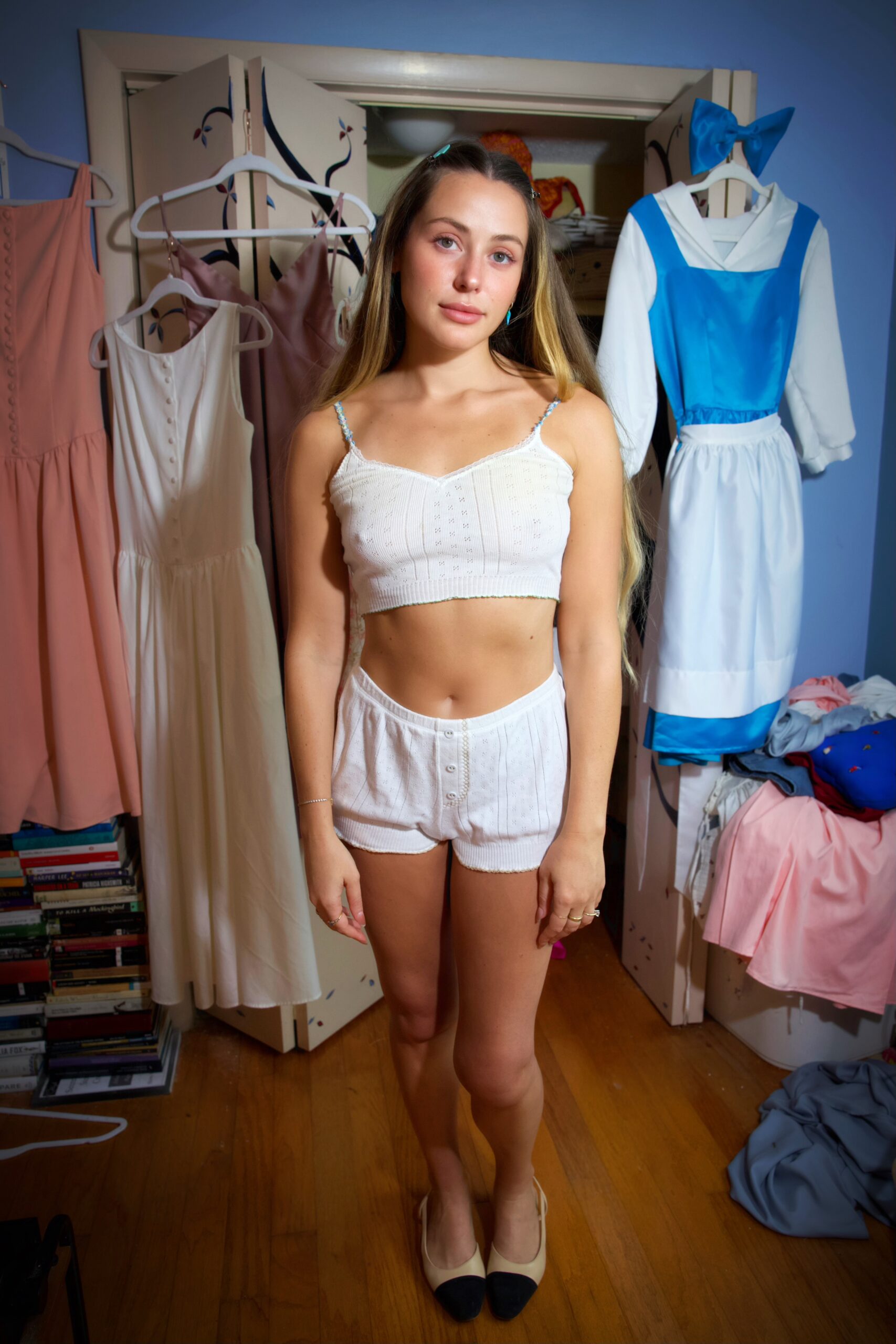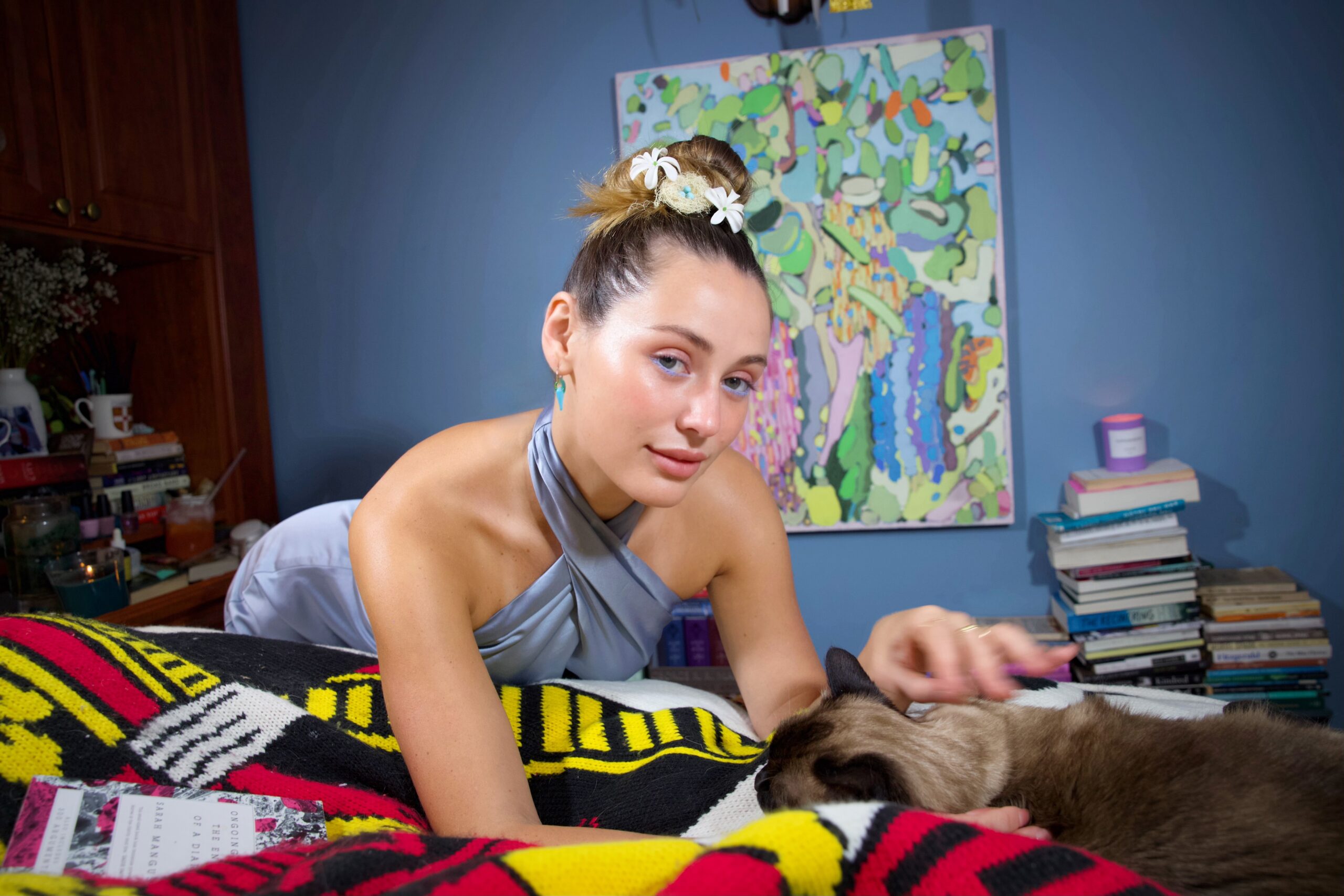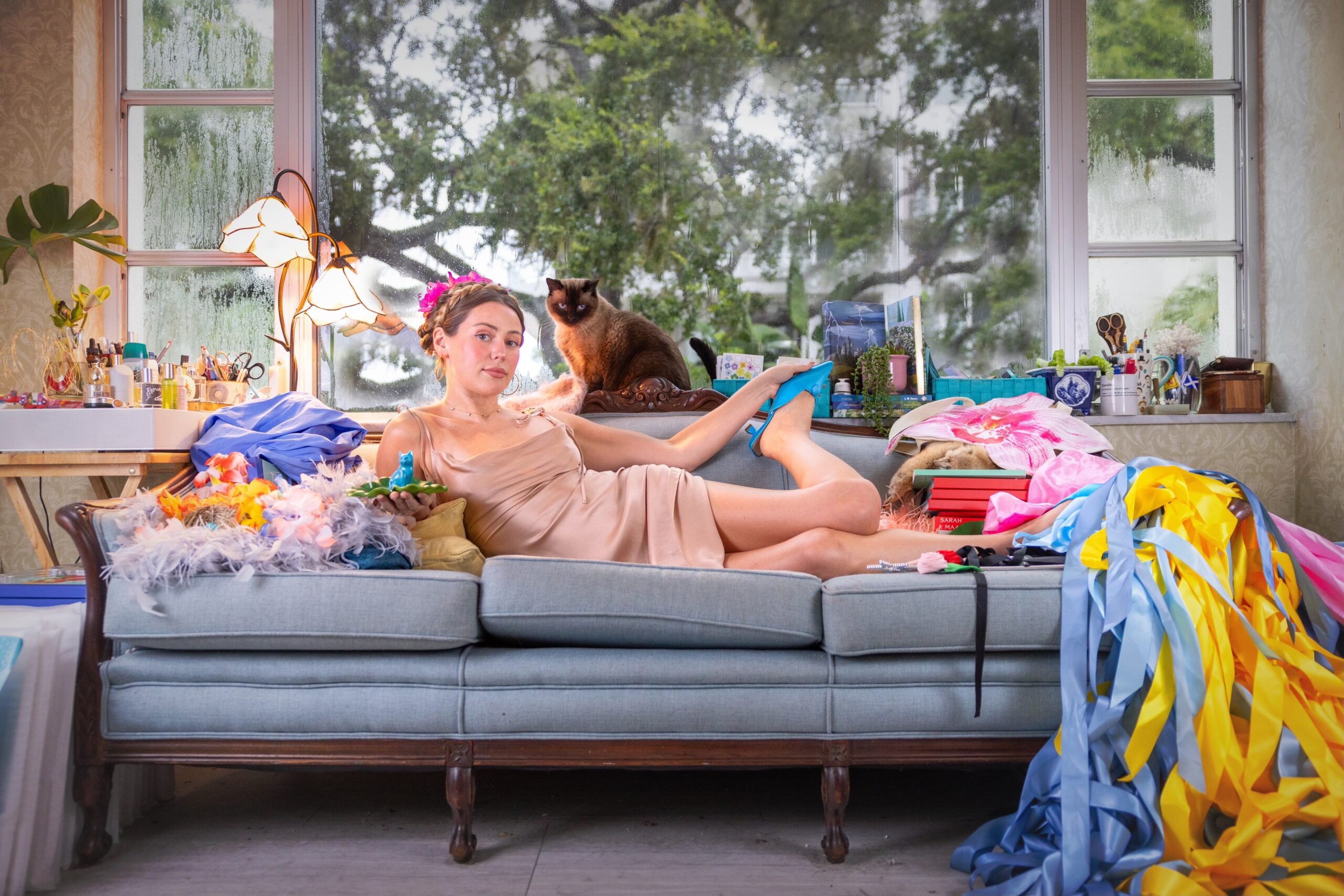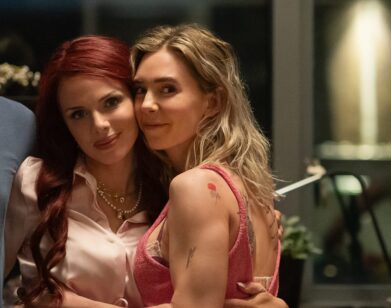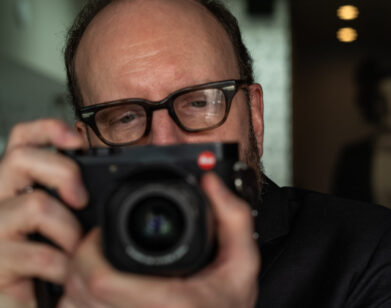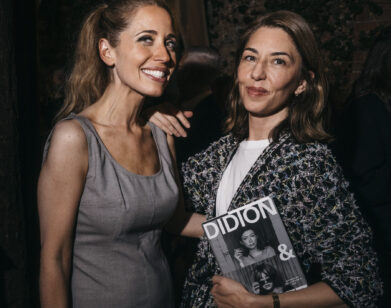IT GIRL
Caroline Calloway Crashed Out of New York. Now She’s Got Some Advice to Share.
In classic Caroline Calloway fashion, the writer and notorious scammer’s latest literary endeavor, Elizabeth Wurtzel and Caroline Calloway’s Guide to Life, begins with Calloway explaining why she probably won’t be sued for publishing it. The book itself is an ambitious revival of the late Wurtzel’s little-known advice memoir, originally published in 2001. Calloway’s remix began as an effort to avoid the possible wrath of the Wurtzel estate, resulting in a book that excerpts the high and lowlights of Wurtzel’s life, all while circumnavigating copyright law. It’s part biography, part memoir, holding up Wurtzel’s life as a mirror for Calloway’s own.
In the 1990s, Elizabeth Wurtzel was maligned for many things that have become conventions of popular literature: sexy book covers, navel-gazing, trauma-dumping, et cetera. And while many critics mocked the writer for what they called her narcissism, Wurtzel herself never sought pity from the general public. The allure of Wurtzel’s chaos was real, and Calloway’s own power derives from her ability to weather it, sharing the plain facts of her life with both generosity and tact. As Calloway sees it, our contemporary digital lives, and the concurrent rise of the literary it-girl, can be traced back to Prozac Nation. But what seems most evident about this so-called class of “sad girl” writers is their steady competence. Though their prose details the very real challenges of their lives, they still manage to secure book deals in the first place.
Last month, before her guide to life hits bookshelves, I got on Zoom with Calloway, who now resides in her post-New York refuge of Sarasota, Florida. We gossiped about literary love triangles and complicated father figures, but more importantly, whether or not a woman who makes her life her art—and her art her life—is inherently tragic.
———
JULIETTE JEFFERS: I wanted to start with this quote from the beginning of the book where you’re like, “I’m never going to learn to meet deadlines if I keep declaring myself the publicist of every mistreated female memoirist out there.” Obviously, you consider Elizabeth Wurtzel a literary mother. Do you feel as though it falls on Wurtzel’s literary daughters to protect her legacy?
CAROLINE CALLOWAY: I’m focusing on Elizabeth Wurtzel, but we need more sad girls to publicize the other forgotten women from history, so that these great writers don’t slip away. It’s a call to action, because I can’t do it all myself. I’ve been declaring myself Elizabeth Wurtzel’s publicist, but only in a temporary fashion. I want to see this book be a jumping off point for, “Where’s her biography? Where are her published manuscripts? Why is her advice book fully out of print and has been for like 20 years?” I’m declaring myself Elizabeth Wurtzel’s publicist, but I am also declaring a call to action for others to help, because I cannot do this alone.
JEFFERS: And the interest is clearly there. For example, Lili Anolik’s book [Didion and Babitz] suggests an ongoing interest in the literary “it-girl” as a type. And women continue to be obsessed with this type.
CALLOWAY: Yes.
JEFFERS: How have you witnessed this type evolving? Wurtzel is, in some ways, a very different literary it-girl than our contemporary ones, but her legacy is still very influential.
CALLOWAY: I love that the term “lit girl” is really entering the modern dictionary. I love the piece that Allie Rowbottom wrote about lit girls for Byline, and she actually just wrote another piece for Elle about Lili’s book, where she mentioned me, which was honestly the biggest honor of my career. But I love that the term “lit girl” is becoming commonly used. I’m actually starting a podcast called Lit Girls. Just before this call, I was actually talking to Alexi Wasser. She’s going to do our Joan Didion episode. Obviously, we have Lili Anolik doing our season premiere. We’re going to have a lot of lit girl experts and lit girls in their own right covering other lit girls, like Cat Cohen, Lena Dunham, Julia Fox, Gabi Abrao. I’m trying to book Jenny Slate, but I haven’t heard back from her publicist. I’m really trying to make the podcast I want to exist.
JEFFERS: This concept of literary it girl feels very New York-centric. It appeals to a very particular milieu of women. And you now live outside of that milieu, in Sarasota. Do you think it’s universal?
CALLOWAY: Before Allie Rowbottom included me in an Elle article with Joan Didion and Eve Babitz, one of the other career highlights of my life was when New York Magazine published that “It Girl” issue and put me on this list with my heroes like Julia Fox and Cat Marnell. And even Emily Ratajkowski, whose beauty and intelligence just absolutely frightens me. I was the only person on this list who had not set foot in New York in over two years. I really think that if you make a big enough splash while you’re in New York, you can coast off that energy for years. And that’s not a tribute to New York specifically. I think it’s just a testament to how one handles fame and plays the internet like a church organ. It’s more about being able to do things worth remembering.
JEFFERS: To that point, one of the key observations you make in this book is the way in which Wurtzel wasn’t internet savvy. She was pre-internet in many ways. She was never going to make it as an e-girl, you know?
CALLOWAY: I know. Elizabeth Wurtzel never really understood social media. And when she got blacklisted from the publishing industry for just being too high on Ritalin, and difficult and loud and messy and opinionated, she did not have the digital wherewithal to cut out the middlemen of publishing and just get her writing out there. And because of that, we have very little of it. She only published four books in her lifetime. It’s really only the first two that are significant memoirs. Many people would say the only significant one is Prozac Nation, although I firmly think that More, Now, Again is one of the best books ever written and I’ll die on that hill. But later on, she was really at the mercy of online editors, who occasionally gave her gainful employment from writing. But otherwise, she was not able to share her writing with the world. And I find that a great tragedy.
JEFFERS: What led you to self-publish this book?
CALLOWAY: Because I got blacklisted too, dude. So I blew up my Cambridge book deal, which is totally on me. Enormous L, big mistake, I sold a book I had no intention of writing. After I did that, and I finally got over my amphetamine addiction, and then got over the grief of the twin tragedies of my father’s suicide and the public shaming that came with Natalie trying to take credit for my work, I knew that I would have to pay my dues. I wouldn’t be able to get another book deal. Or, if I did, it would be for some outrageously low sum. No one was going to give me half-a-million dollars a second time. And I thought that was totally fucking fair. So I turned to self-publishing because I knew that I had the internet following to make a business like this work. Honestly, it was so profitable and it’s so creatively fulfilling. I get to decide exactly what my title is. I get to decide whether the cover has foil or if it’s glossy or matte. I get to decide what font the page numbers are in. I get to decide if we’re going to include a note about the font in the back of the book. I’m so deeply proud of this Wurtzel book, and I have so many ideas of books I want to make. And the turnaround is like three months. From the day I submit the final manuscript to having the book in hand, it’s three months. It’s lightning speed. I love that rapidity, in addition to the creative control. And the fucking money.
JEFFERS: Three months is pretty insane.
CALLOWAY: It’s so great. My five-year plan is I’m going to stay in Florida for a couple more years and use up the rest of the downtown it-girl memory fuel that I’m currently running on to crank out books. Over five, ideally 10. And then, I’m just going to let myself be bought out of the current Caroline Calloway Literary Estate and I’m going to take that money to buy a studio in the West Village. And then, I’m going to move back and take a break for a couple of years in my mid-to-late 30s. And then I’m going to come back to Florida in my early 40s, and rinse and repeat.
JEFFERS: Love that. Reading this book, it’s clear you see Wurtzel’s life as this mirror of your own. How did that relationship begin?
CALLOWAY: I was in college when I first bought her book. I must have had three, four copies of Prozac Nation lying around every dorm room or apartment I lived in in my early 20s. Obviously, I look up so much to Cat Marnell and feel like we also share a similar literary legacy or we live in the same kingdom of memoir. It’s voicey, it’s experimental, it’s scandalous, it’s juicy, it’s delicious. Where Cat and I diverge in a way that Elizabeth Wurtzel and I do not, is that Cat is a graffiti artist. She’s very grunge. She loves Courtney Love. And Elizabeth Wurtzel, she was very Cambridge. She loved Harvard. She went to Yale Law School. I wish I loved something cooler than prestigious universities, because I have a tender heart and I care about being liked, but I can’t help but love them. The truth of me is that I find so much inspiration in castles and secret societies and balls and even just the embarrassingly colonial architecture of those institutions. I mean, the whole thing is just so humiliating, but it’s the truth. So I love that about Elizabeth Wurtzel. She loved that same world. Elizabeth Wurtzel and I share Cambridge, we share amphetamine addiction, we share being blacklisted from publishing. It’s just the internet age that separates us. I don’t think there’s any other author ever who cared about Cambridge and was addicted to legal meth and found herself knocking on the locked door of traditional publishing houses.
JEFFERS: When it comes to sad girl writers or messy girl writers, the most interesting thing about them sometimes is the fact that they do lead these deeply productive lives. They’re very capable and they manage to write books and secure book deals, even if they lose them. And I feel like this book really makes an argument for the capability of these kinds of women. Did you ever feel the need to exaggerate the messiness of any of your life in your writing? Do you ever feel like your competence is overlooked?
CALLOWAY: Oh, I never felt the need to exaggerate my messiness, because unfortunately I will never be able to change the truth of how messy I was in the past. I don’t need to exaggerate it. In fact, I wish I could minimize it a bit in retrospect.
JEFFERS: That’s a healthy impulse.
CALLOWAY: And in terms of people overlooking my competence, of course they do. One of the next books I’m going to publish is The Cambridge Captions. And it’s not because I think that Instagram captions are so profound or even that it’s my best work, because I wrote them in my early 20s. It’s like my college writing. And in some ways, it’s a little childish and embarrassing to me, but it’s very important to me that people know that I alone made the body of work that was my Instagram. Natalie only ghost-wrote the book proposal, the internal document that publishers saw. But she did a really brilliant job in her Cut essay. She really positioned herself as the mastermind behind my PR, behind my brand, and me as just sort of the vapid pretty face. Four years later, since I’ve stayed so relevant and had lots of new scandals, like OnlyFans and Ziwe and Hurricane Milton, I think people understand better now that I’m the one steering the ship of this interesting life and there isn’t another puppet master behind it. And of course, the critical success of Scammer was such gorgeous validation that people knew that I could be an excellent writer, that I could make “a masterpiece,” as The Washington Post called it.
JEFFERS: One of the things both you and Wurtzel understood is the need to put on a show. It is one of the things that Wurtzel was most maligned for in the 90’s. There were literally articles written that were like, “She’s smart, her prose is smart, and she seems to come to pretty clear realizations about the realities of womanhood and adulthood in the end, but why’d she have to show her tits on the cover?”
CALLOWAY: I didn’t even mean to make this my second book. I was supposed to finish the fucking Cambridge Captions next. I don’t want to spend the rest of my life talking about Natalie. But it literally possessed me when I realized that this is the first book not just written about Wurtzel since her death, but written about her ever. We have so little of her, it drives me crazy. And I absolutely lose my mind when I start thinking about how bad a job we as a society are doing of preserving and publicizing what little of Wurtzel we have available.
JEFFERS: What made you feel like you wanted to offer advice in the same manner that Wurtzel did?
CALLOWAY: Honestly, I could have taken the entirety of More, Now, Again, her second memoir about Ritalin addiction, and just put it out with my little Dead Dad Press with a better cover and a better press rollout. As so many of my plans go, it was unfortunately against the law. I was like, “Well, I’ve never actually broken the law or had any debt I didn’t pay back. I paid back that 40 grand to my landlords and the $100,000 to the publishers.” But I decided to do an advice book, honestly, because that book has been out for 20 years and the Wurtzel estate is in such a mess, so I thought it would be the one that I could quote from most heavily with the least legal repercussions. Her position in the culture is like, “Why would we take advice from this crazy woman? “ So I decided that publishing an advice book would create almost the same societal chemical reaction as what she did in 2000 when she published her own.
JEFFERS: A little rage bait.
CALLOWAY: Yeah, it’s definitely rage bait, but I think of it more as smart PR. I don’t think it’s totally rage bait, because I do think that the advice is good and valid. I really think that Elizabeth Wurtzel and I stayed in our goddamn lanes when it came to the advice we dole out in this book. Readers, I promise there’s nothing about financial planning or the conflict in Gaza.
JEFFERS: There’s solid advice on lip liner.
CALLOWAY: I stuck to only the things I knew in my bones to be true and that have really been the better decisions I’ve ever made. I believe in the advice in the book. And we’re also the exact same age. She was 32 when it came out, so it just felt spooky and perfect and a little magical. And in regards to her unpublished work, Jia Tolentino and Emily Gould in their respective obituaries for the New Yorker and for Vanity Fair talked about an unfinished manuscript that was an expansion of Elizabeth Wurtzel’s “Bastard” article that she did for New York Magazine. If I could have only one thing, it would be to get that fucking manuscript found and published. My god.
JEFFERS: She found out that her father wasn’t her actual father, basically.
CALLOWAY: I know. She spent her whole life trying to solve the wrong problem. Her relationship with her dad and her inability to connect with him occupies so much of her work, and I can only assume it occupied so much of her time and energy, and she died before she ever was able to. This is why we need to see the Bastard manuscript. The sad girls need this.
JEFFERS: Also, the David Foster Wallace, Elizabeth Wurtzel, David Lipsky love triangle is—
CALLOWAY: It’s insane.
JEFFERS: It’s something that you hint at in the book.
CALLOWAY: To be clear, it wasn’t exactly a love triangle. I think she fucked David Foster Wallace. Actually, I know exactly what happened. She fucked David Foster Wallace immediately after the white-hot fame of Prozac Nation. They met at KGB, that red room on the second floor with all the sickles. That was right around her big fame boom. And then, years passed and Bitch wasn’t received as well, everyone forgot about More, Now, Again. I think she met Lipsky after or around the time that Bitch came out, so her reputation wasn’t as good. They fucked then and she moved to Florida. Then she came back, tried to hook up with Lipsky again. According to him, he wasn’t into it, but she moved into his house for six weeks because she was out of money and she needed to turn in the More, Now, Again manuscript. It was overdue. She was going to AA meetings and he was trying to bring this other girl home, but he couldn’t because Elizabeth was at his apartment. That’s the way he tells the story. But Lipsky also lied to the New Yorker about saying I was a better writer than Natalie, and Lili Anolik will back me up on this. I don’t know how reliable a narrator he is, but I also don’t know if I even want this smoke, because we had a whole fight at Lili’s party about him lying—
JEFFERS: I think the Airmail quote was, “Caroline Calloway and David Lipsky outside the party, fighting.”
CALLOWAY: I saw that and I was like, “Yeah, we were fighting, but we also made up. Okay, drama queen.” We really had a nice resolution. I think he really wants to be in my life and I really want him to be in mine, but I don’t know. It meant a lot to me when he told me I was a better writer than Natalie. In fact, I really think that healed a deep insecurity-related wound in me. But it wounded me when he tried to remain more neutral publicly so that he could appear to be a better professor. He doesn’t want to seem like he takes sides in his students’ petty struggles. But he’s a wonderful professor. The two best writing professors I ever had were David Lipsky and Sarah Manguso. And on my Cambridge application, I obviously fudged two of my AP scores so that I would have seven fives instead of five fives and two fours. But the rest was completely true. Lipsky and Manguso wrote my two recommendation letters that got me in, and it meant a lot that they believed in me.
JEFFERS: It’s interesting to think about how those relationships continue through life. You have a frankness about loss and about death in all of your writing, and I think the end of this book is really reflective. You talk about Wurtzel’s death, but you also talk about the horrifying tragedy that essentially ended Eve Babitz’s public life. You argue that there’s some sense of inherent tragedy to these literary girls. They die young, and they lose important people in their lives.
CALLOWAY: Or they die in obscurity. What I was trying to say in the last pages of this new book was how little they want our pity, and I think that’s really moving, because my natural instinct is to pity them. A lot of what made me assign myself the job of Elizabeth Wurtzel’s unofficial publicist was that I felt so sad about it all. I think she would be really repulsed by that sadness. I thought that was a very interesting note to end on. She whispered the day before she died about how she had staples in her head. She had breast cancer, but in the end, she died of a brain tumor. Her mind killed her. It was important to end on a note of these women presenting these events as they saw them, which were not tragedies but part of their full, rich lives. It’s really something that men project onto hysterical, emotional female memoirists.
JEFFERS: Do you feel like that act of letting the world see inside your mind is enough of a calling?
CALLOWAY: Oh, absolutely. I think most people out there would not trade lives with me. I think, in many ways, they might even pity me the way we pity these other women for the things that have happened to them. I mean, it was actually statistically incredible luck that my father killed himself in the same 48 hours that Natalie released her article. I was down so astronomically bad then and I’ll be the first to admit that. Lots of people pity me. I don’t really expect to be happy, and I really don’t see personal enjoyment as the point of my life. I don’t really see myself having kids, or getting married, or having a family. Oh my god, I’m literally choking up. I just really believe my purpose is to live a life I want to write about and make books whose plots capture the disparity between what I wanted to happen and what did. For me, it really is enough.

